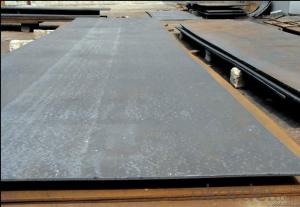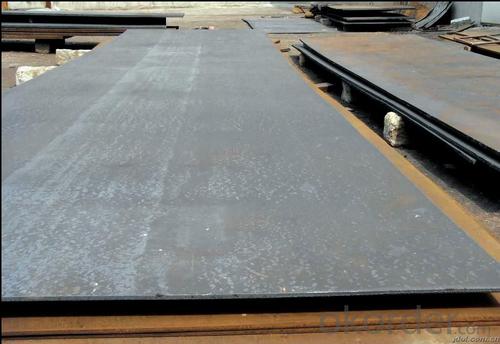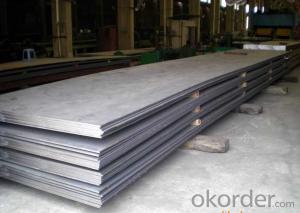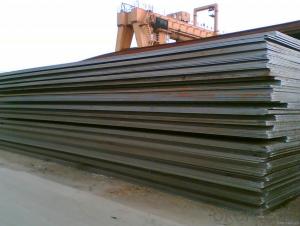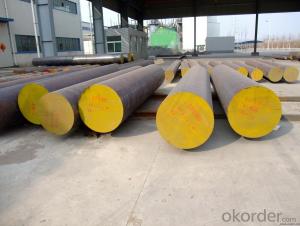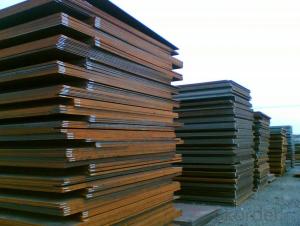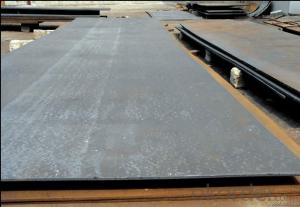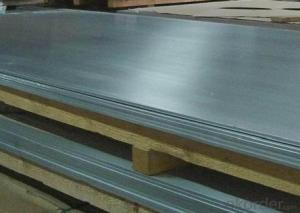Cr12/1.2080/BD3/SKD1/D3 High Carbon Steel Plate
- Loading Port:
- China main port
- Payment Terms:
- TT OR LC
- Min Order Qty:
- 25 m.t.
- Supply Capability:
- 10000 m.t./month
OKorder Service Pledge
OKorder Financial Service
You Might Also Like
Specification
Chemical Composition(%)
| C | Si | Mn | P | S | Cr |
| 2.00-2.30 | ≤0.40 | ≤0.40 | ≤0.030 | ≤0.030 | 11.50-13.00 |
Available Size
| Rolled flat steel | 12-90mm×205-610mm×L |
| Forged flat steel | 100-300mm×400-600mm×L |
Heat Treatment
| Item | Temperature ℃ | Hardness |
| Anneal | 750-760 | ≤255HB |
| Quenching | 950-980 | 59-63HRC |
| Tempering | 180-350 | 58-62HRC |
Characterstics
| 1.High hardening ability and abrasion resistance | ||||||||
| 2.Less quenching deformation | ||||||||
| 3.High toughness and more homogeneous carbide distribution |
Applications: Suitable for various complicated cold working dies with high precision and long lifetime,such as punching dies,cold extrusion dies,thread rolling dies,screw plates,cold extrusion dies,and precise measuring devices
Product show:

Workshop show:

FAQ:
1, Your advantages?
professional products inquiry, products knowledge train (for agents), smooth goods delivery, excellent customer solution proposale
2, Test & Certificate?
SGS test is available, customer inspection before shipping is welcome, third party inspection is no problem
3, Payment Terms?
30% TT as deposit and 70% before delivery.
Irrevocable L/C at sight.
4, Trading Terms?
EXW, FOB, CIF, FFR, CNF
5, After-sale Service?
We provides the services and support you need for every step of our cooperation. We're the business partner you can trust.
For any problem, please kindly contact us at any your convenient time.
We'll reply you in our first priority within 24 hours.
- Q: How does special steel contribute to the machinery manufacturing industry?
- Special steel plays a crucial role in the machinery manufacturing industry by providing high-quality and durable materials for the production of various machine components. This type of steel is specifically engineered to possess exceptional strength, toughness, and resistance to wear, corrosion, and high temperatures. In the machinery manufacturing industry, special steel is utilized in the production of critical components such as gears, shafts, bearings, and cutting tools. These components are subjected to extreme mechanical forces, exposure to harsh environments, and repetitive motion, requiring a material that can withstand such conditions without compromising performance or safety. The exceptional properties of special steel enable machinery manufacturers to produce equipment that is reliable, efficient, and long-lasting. By utilizing this type of steel, manufacturers can enhance the overall performance and durability of their machinery, ensuring optimal functionality and minimizing the need for frequent repairs or replacements. Moreover, special steel allows for the design and production of more compact and lightweight machinery, leading to improved energy efficiency, reduced manufacturing costs, and increased productivity. The high strength-to-weight ratio of special steel enables the production of smaller and lighter components, without sacrificing durability or performance. Furthermore, the corrosion and heat resistance properties of special steel make it suitable for use in industries with demanding operating conditions, such as aerospace, automotive, and energy. It ensures that machinery can withstand extreme temperatures, chemical exposure, and abrasive environments, enhancing safety and reliability. In conclusion, special steel significantly contributes to the machinery manufacturing industry by providing materials with exceptional strength, toughness, and resistance to wear, corrosion, and high temperatures. Its utilization in critical components ensures the production of reliable, efficient, and durable machinery, leading to improved performance, reduced costs, and increased productivity.
- Q: How is high-temperature steel used in power generation equipment?
- High-temperature steel is used in power generation equipment due to its exceptional heat resistance properties. It is specifically employed in components such as boiler tubes, turbine blades, and exhaust systems, where intense heat and pressure are present. This steel's ability to withstand extreme temperatures ensures efficient energy conversion and maximizes the overall performance and reliability of power generation equipment.
- Q: How does special steel contribute to the oil and gas machinery industry?
- Special steel plays a crucial role in the oil and gas machinery industry by offering exceptional strength, durability, and corrosion resistance. It is commonly used in the manufacturing of drill pipes, valves, pumps, and other critical components. The high tensile strength of special steel ensures the safe and efficient extraction of oil and gas, while its resistance to extreme temperatures and harsh environments enhances the reliability and longevity of machinery. Additionally, special steel's ability to withstand high-pressure conditions and prevent leakage makes it an essential material in the oil and gas sector.
- Q: What are the properties of precipitation-hardening steel?
- Precipitation-hardening steel, also known as PH steel, possesses several notable properties. One of its key features is its ability to be strengthened through a heat treatment process, known as precipitation hardening. This process involves heating the steel to a specific temperature and then rapidly cooling it, followed by aging at a lower temperature. This treatment causes the formation of fine particles within the steel, leading to increased strength and hardness. Another important property of precipitation-hardening steel is its excellent combination of strength and corrosion resistance. This steel alloy is often used in applications where both high strength and resistance to corrosion are required, such as in aerospace and marine industries. Additionally, precipitation-hardening steel offers good weldability, making it suitable for various fabrication processes. Furthermore, this type of steel is known for its versatility as it can be tailored to meet specific mechanical properties by adjusting the heat treatment parameters. This allows manufacturers to customize the steel's strength, toughness, and other characteristics according to the desired application. In summary, precipitation-hardening steel is characterized by its ability to be strengthened through a heat treatment process, its excellent combination of strength and corrosion resistance, and its versatility in achieving desired mechanical properties.
- Q: What are the main factors affecting the toughness of special steel?
- The main factors affecting the toughness of special steel include its chemical composition, heat treatment process, and microstructure. The chemical composition determines the presence of alloying elements that can enhance toughness, such as nickel, chromium, and molybdenum. The heat treatment process, including quenching and tempering, can alter the microstructure of the steel, influencing its toughness. A fine and uniform microstructure with a controlled distribution of phases can enhance toughness. Additionally, factors like grain size, inclusion content, and the presence of residual stress can also impact the toughness of special steel.
- Q: How does special steel perform in cryogenic environments?
- Special steel performs well in cryogenic environments due to its high strength, toughness, and resistance to embrittlement. It can withstand extremely low temperatures without losing its mechanical properties, making it suitable for various applications in industries such as aerospace, energy, and medical.
- Q: Can special steel be used in the production of springs for automotive suspension?
- Yes, special steel can be used in the production of springs for automotive suspension. Special steel, such as alloy steel or high-carbon steel, offers excellent strength, durability, and resistance to fatigue, making it suitable for handling the heavy loads and constant vibrations involved in automotive suspension systems.
- Q: How does special steel contribute to reducing product failure?
- Special steel contributes to reducing product failure in several ways. Firstly, special steel is known for its superior strength and durability, which makes it less prone to breakage or deformation under stress. This ensures that products made with special steel can withstand heavy loads or harsh environments without failing. Additionally, special steel often has enhanced corrosion resistance properties, protecting products from rust or degradation over time. This helps to extend the lifespan of the product and reduce the chances of failure due to corrosion. Furthermore, special steel can be tailored to specific applications, allowing manufacturers to choose the right type of steel with the required characteristics for their products. Whether it's high temperature resistance, excellent wear resistance, or improved toughness, special steel can be customized to meet the specific demands of a product, reducing the likelihood of failure in its intended use. In summary, special steel's superior strength, corrosion resistance, and customizable properties make it an essential material in industries where product failure is a critical concern, ultimately contributing to reducing the risk of failures and enhancing overall product reliability.
- Q: How is the quality of special steel ensured?
- The quality of special steel is ensured through a combination of rigorous testing, strict quality control measures, and adherence to international standards and specifications. Special steel producers employ various methods such as chemical analysis, mechanical testing, and non-destructive testing to verify the composition, strength, and integrity of the steel. Additionally, special steel manufacturers often have dedicated quality assurance teams that closely monitor the production process to identify any potential issues and ensure the final product meets the required specifications.
- Q: What are the main factors that affect the machinability of special steel?
- The machinability of special steel can be influenced by several factors. One of the main factors is the composition of the steel itself. Special steels often have complex alloys added to enhance their properties, such as increased strength or corrosion resistance. However, these alloying elements can also have a negative impact on machinability. Elements like chromium, nickel, and molybdenum can cause the steel to become more difficult to machine due to their hardening or abrasive properties. Another factor that affects machinability is the microstructure of the steel. Special steels can undergo various heat treatments to achieve desired properties, but these treatments can also change the microstructure of the material. For example, the presence of carbides or precipitates can make the steel harder and more brittle, leading to increased tool wear and poorer machinability. The hardness of the steel is another important factor. Harder steels generally have lower machinability as they are more resistant to cutting forces. High-speed steels, which are commonly used for machining, can be used to counteract this issue to some extent. However, excessively hard steels may require specialized tooling or machining techniques to achieve satisfactory results. The presence of impurities or non-metallic inclusions in the steel can also affect machinability. These impurities can disrupt the cutting process, leading to reduced tool life and surface finish. Special steel manufacturers often strive to minimize impurities and control inclusion content to improve machinability. Lastly, the cutting parameters and machining conditions play a significant role in determining machinability. Factors such as cutting speed, feed rate, and depth of cut need to be optimized to achieve the best balance between material removal rate and tool life. Coolant usage and chip evacuation are also crucial considerations to prevent excessive heat buildup and chip recutting, which can negatively impact machinability. In summary, the main factors that affect the machinability of special steel include composition, microstructure, hardness, impurities, and cutting parameters. Understanding these factors and applying appropriate machining techniques can help maximize productivity and achieve high-quality machined components from special steels.
Send your message to us
Cr12/1.2080/BD3/SKD1/D3 High Carbon Steel Plate
- Loading Port:
- China main port
- Payment Terms:
- TT OR LC
- Min Order Qty:
- 25 m.t.
- Supply Capability:
- 10000 m.t./month
OKorder Service Pledge
OKorder Financial Service
Similar products
Hot products
Hot Searches
Related keywords
